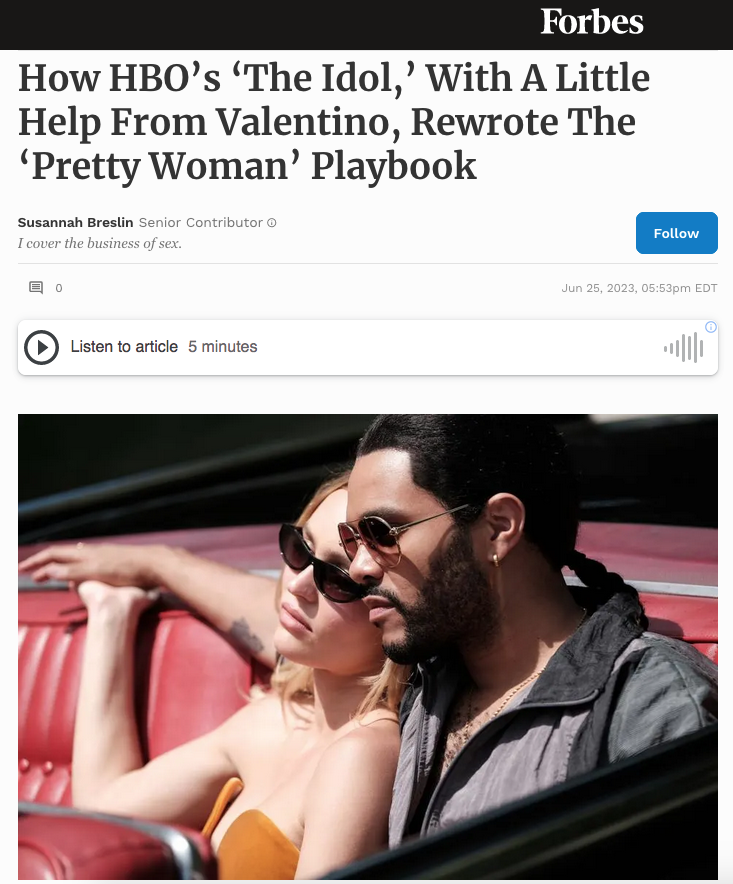[ad_1]
In the 3rd episode of the controversial HBO sequence “The Idol,” Jocelyn, a pop star played by Lily-Rose Depp, and Tedros, a slimy wannabe Svengali performed by Abel “The Weeknd” Tesfaye, head off for a purchasing spree at the Valentino boutique on Rodeo Push in Beverly Hills. Following bypassing a gaggle of adoring Jocelyn admirers out entrance, the duo undertake some retail therapy. “You see that youthful girl over there?” Tedros asks a shop employee. “Got anything at all in this store as lovely as she is?” Jocelyn attempts on a series of Valentino outfits as Tedros eggs her on, threatens to “suppress stomp” an personnel he believes his ogling his girl, and dismisses just one best as “trash.”
Sooner or later, the pair end up acquiring sex in a dressing room. When Jocelyn exits ahead of Tedros can complete, he finishes himself off on your own in the dressing area though holding on to a rack of Valentino garments. Afterwards, he looks at his soiled arms. Then his gaze turns to the extremely pricey Valentino red dresses hanging close by. The digicam cuts away, but the implication is apparent: he wipes his fingers off on the dresses.
Did Valentino signal off on this? I puzzled as I viewed the scene. After all, Valentino is a commemorated luxurious manner manufacturer. Launched in 1959 by Valentino Garavani, its patterns have been worn by Jackie Kennedy, Princess Diana, and Oprah Winfrey. Had Valentino cosigned on what appeared to be the bespoiling of its brand—or was this was what products placement appeared like in 2023? In research of an remedy, I attained out to Valentino for comment. I did not get a reaction back again.
For an expert’s consider, I sent an electronic mail to Stacy Jones, the CEO of Hollywood Branded, a pop lifestyle promoting agency. She didn’t know if there was any brand name partnership involving Valentino and “The Idol,” but she did present her take on the provocative Valentino scene, which experienced produced some debate on Twitter.
“While the scene in the Valentino shop was undoubtedly explicit, there is not destruction to the brand name,” Jones opined. “Even the derogatory mentions created by Tedros about some of the types and the store’s stylist experienced no lasting destructive effect. Tedros is shown to be the not-so-nice character he is, and it was in actuality Tedros who came off searching inadequately, not Valentino. The developing spotlight on Valentino dressing Lily-Rose’s character and getting her design their apparel on monitor feels like a gain irrespective. The expressing that you just can’t fork out for media worth that is real. This specific product placement is around delivering on brand awareness massive time. There is not a great deal of hazard in offending more mature Valentino shoppers as they simply just won’t be observing the series. They are not the concentrate on viewers.” These days, Valentino may possibly be additional intrigued in targeting millennials and Gen Z as likely consumers. According to Bain & Co.: “These generations are expected to account for as considerably as 70% of the world luxury industry by 2025.”
Not only that, it seemed I experienced skipped the issue fully. As Jones pointed out in her e-mail to me, the Valentino scene from “The Idol” was a redux of a scene from the 1990 film “Pretty Girl,” starring Julia Roberts as Vivian Ward, a Hollywood escort, and Richard Gere as Edward Lewis, a rich businessman, right down to the “Do you have nearly anything in this store as beautiful as she is?” line. “I googled to see in which [the boutique shopping scene] in ‘Pretty Woman’ was filmed as I imagined it experienced a large chance of currently being Valentino,” Jones included. “This short article states ‘Pretty Woman’ filmed the Rodeo Generate scene especially at Valentino. There are a large amount of similarities in the scenes, just taken up many grownup notches with an edgier, modern touch.”
Is “The Idol” “‘torture porn’”? Has it “set again the feminist motion by at minimum a 10 years”? Is it “anti-feminist spectacle”? Or is a thing extra complex at function? At minimum in the situation of the Valentino scene, the subtext is resolutely feminist. In “Pretty Female,” Vivian says: “I want the fairy tale.” she wishes a gentleman to rescue her. In Sam Levinson’s “The Idol,” the fairy tale is above. Right after all, it’s Jocelyn who denies Tedros his personal enjoyment, who is the star, and who, we presume, foots the invoice for their procuring journey. In this retelling, the woman holds the power, not the person.
On a the latest Friday afternoon, I made my way to the Valentino boutique. Due to the fact it was late June, the perfectly-heeled customers earning their way up and down the sidewalks experienced to share place with teams of visitors. In the Valentino retailer, I was achieved by a stability guard. A salesperson adopted me about as I admired a pair of $1,800 see-as a result of platform pumps that reminded me of the strippers’ shoe brand of decision, Pleaser Footwear, and a purple costume that appeared like one particular Jocelyn experienced worn. On the next ground, the salesperson indicated the dressing home wherever the racy scene for “The Idol” had been shot, supposedly. I opened the door. No a single, considerably fewer Tedros, was there.
This write-up was originally released on Forbes.com.
I cover the business of intercourse | Web site | Forbes | Twitter | Instagram | LinkedIn | Email
[ad_2]
Source link
